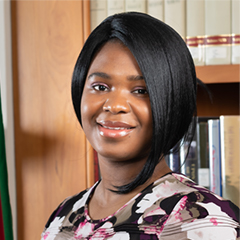Loudoun Laurels Foundation Scholar 2016-2020
Ngozi Akingbesote immigrated from Nigeria to the United States in 2012, She attended Dominion High School and graduated with an advanced diploma in 2016. Ngozi went on to obtain her Bachelor’s degree in Biology with Distinction from the University of Virginia where she was both a Loudoun Laurel Foundation scholar and Esperanza education fund scholar. She is currently pursuing her Ph.D. in Cellular and Molecular Physiology at Yale School of Medicine, where she is a Gem Full Fellow and Howard Hughes Medicine Institute Gilliam Fellow.
Her research focuses on breast cancer, which is the second leading cause of cancer deaths in women, with one in eight women in the U.S. developing the disease over her lifetime. She is specifically focused on the most lethal form of breast cancer; triple-negative breast cancer (TNBC), which causes the majority of deaths related to breast cancer. Recently, immunotherapy alongside chemotherapy has become the standard of care for women with advanced TNBC. However, immunotherapy is not curative for metastatic TNBC in the majority of cases. Additionally, the side effects caused by immunotherapy are harmful. Therefore, there is an opportunity to find ways to increase the benefits of immunotherapy while not exacerbating its side effects. Such strategies will help increase the quality of life for TNBC patients undergoing immunotherapy treatment. Exercise is known to be protective against many types of cancers, including TNBC. One theory that has been put forward to explain exercise’s cancer-preventive and therapeutic properties is its ability to alter whole-body metabolism. However, the processes by which exercise causes these changes, particularly the effects and mechanism of exercise’s impact on the immune system, are not well defined. Therefore, the goal of Ngozi’s research is to test the hypothesis that exercise improves responses to immunotherapy and reduces its side effects in the treatment of TNBC by altering whole-body immune metabolism. Her work will generate preclinical evidence to form the foundation for clinical trials of exercise as an adjuvant to immunotherapy in patients with breast cancer.
Additionally, Ngozi serves as the Vice President of Diversity, Equity, and Inclusion at Nucleate New Haven, where she is responsible for ensuring that the New Haven Nucleate program exemplifies and practices diversity at all levels. She also serves as the Outreach Chair for Yale BBS Diversity and Inclusion Collective where she works to provide access to science education and science communication opportunities and resources, available at Yale and within Yale’s networks, to engage, empower, and advance underrepresented, disadvantaged, and marginalized individuals in the biological and biomedical sciences to increase career readiness. At Yale, she has been awarded the President Public Service Fellowship, the Annie Le Fellowship Award, and the Dean’s Emerging Scholars Research Award for her diligent work in both service to the Yale community and her research work. After her Ph.D., she plans to transition to industry and augment her skills in discovery and preclinical research.

